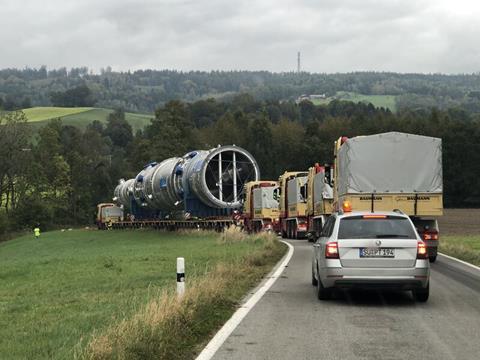The European association of abnormal road transport and mobile cranes (ESTA) has received a response from the European Commission to its letter calling for urgent action to resolve the crisis facing heavy transport in Germany.

HLPFI readers will recall that ESTA director Ton Klijn wrote to the German government and the European Commission last month, pleading them to address the situation in Germany caused by weak infrastructure and long delays in issuing permits.
Although Klijn’s letter focussed on the immediate issues in Germany, he said that the problems facing the heavy transport industry were impacting European industry as a whole.
He called for an agreed programme of infrastructure investment, the development of heavy transport routes, the creation of an agreed Europe-wide electronic permitting system and common rules and regulations on the size and weight of loads. The letter also said that the commission’s current revision of the Directive 96/53/EC on weight and dimensions of road transport offers a ‘golden chance’ to bring about change.
In response, a letter has been written by Kristian Schmidt, land transport director at DG Move, the commission’s directorate general for mobility and transport, on behalf of the European commissioner for transport Andina Vălean.
It said that the commission “fully recognises” the importance of abnormal and heavy transport for the European economy and added that the work on revisions to the directive has put the spotlight on the current challenges facing the sector, including “diverging national and regional requirements for applying for permits, complex procedures, delays in issuance of permits and associated additional costs for operators.”
He added: “Therefore, improving efficiency and safety of transport of abnormal and heavy loads across the EU is one of the specific objectives of the revision of the directive. The measures suggested in your letter will be reflected, to a large extent, in the legislative proposal that the commission will adopt in July, as part of the Greening Freight Package.”
He concluded: “Thanks to your practical expertise and continuous support, we can propose a favourable regulatory framework facilitating smooth functioning of the heavy and abnormal transport and supporting the development of abnormal transport infrastructure.”
Klijn is cautiously optimistic: “The positive tone of the letter from Kristian Schmidt is very welcome, but it does not yet change anything on the ground. We hope that DG Move will be as good as its word and start to put in place measures that will both harmonise standards across Europe and ensure that member states comply.
“We look forward to hearing more and continuing the discussions in the coming weeks.”
















